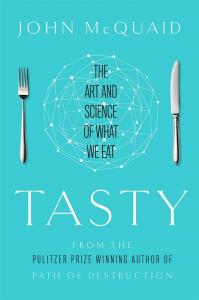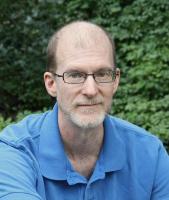John McQuaid: Tasty
John McQuaid
Scribner, January 2015. $26.00
ISBN: 978-1-4516-8500-8
McQuaid reports:
I became interested in the science of taste by way of the sheer frustration of feeding my two children. Born two years apart, they were both picky eaters. Yet their pickiness only barely overlapped. From an early age, my son loved hot peppers and extreme tastes; he’d cut up a lime, and eat it for refreshment. My daughter hated spiciness, preferring bland, comfort foods, such as rice, mashed potatoes, chicken, and mac and cheese.
And so I wondered, why did these differences exist? Where did they come from? Since the children share both genes and an environment, stock explanations would not suffice. When I began looking into these questions, a whole world opened up. After some preliminary research, I put together a detailed book proposal, which my agent sold to Scribner.Initially, the idea was to cover the topic taste-by-taste — sweet, sour, bitter, et al. — along with other senses involved in flavor, such as smell and touch. Pretty early on, I switched to a narrative approach. The book is a brief biography of flavor: It begins in the primordial ooze of the Cambrian explosion 500 million years ago, when life first began devouring other life, then covers the emergence of humanity, the taming of fire and of fermentation, and the arrival of civilization and history. It concludes by looking at the modern food system and where — since they never stopped evolving — our tastes are headed.
This structure allowed me to tell the story of the human flavor sense, which differs from that of other mammals in crucial ways, while exploring evolution, genetics, molecular biology, neuroscience, and psychology.
I read hundreds of scientific papers to get a sense of the state of the research, and interviewed dozens of scientists. I also did fun stuff: I took my daughter to visit to a cheese maker, and my son to visit the guy growing the hottest chili peppers in the world. The biggest challenge was fitting all these diverse elements together in an engaging way while not dumbing down the content, or oversimplifying the science.
Contact info:
- John McQuaid, 202-596-5160, jmcquaid1@gmail.com
- McQuaid's website: http://johnmcquaid.com
- Agent: Kris Dahl, 212-556-5686, kdahl@icmpartners.com
- Publicist: Alexsis Johnson, 212-698-2451, alexsis.johnson@simonandschuster.com
- Book website: http://www.tastybook.net
- Blog website: http://www.forbes.com/sites/johnmcquaid
NASW members: Will your book be published soon? Take advantage of this opportunity for shameless self-promotion.
Tell your fellow NASW members how you came up with the idea for your book, developed a proposal, found an agent and publisher, funded and conducted research, and put the book together. Include what you wish you had known before you started this project, or had done differently.
See https://www.nasw.org/advance-copy-submission-guidelines.
Send info and images to Lynne Lamberg, NASW book editor, llamberg@nasw.org.





